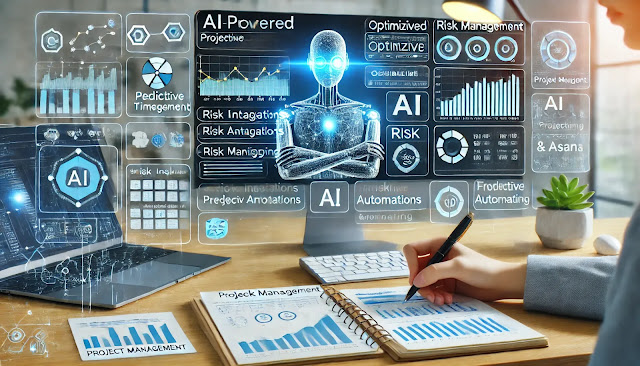The Impact of Artificial Intelligence on Project
Management
Artificial Intelligence (AI) is revolutionizing project
management by enhancing efficiency, improving decision-making, and fostering
better collaboration among teams. As organizations increasingly adopt AI
technologies, project managers must understand how these tools can optimize
processes and drive project success. Here’s a closer look at the impact of AI
on project management.
1. Enhanced Planning and Scheduling
AI-powered tools can analyze historical project data to
improve planning and scheduling. These systems can identify potential risks and
suggest optimal resource allocation, allowing project managers to create more
accurate timelines and budgets.
Predictive Analytics: AI uses predictive analytics to
forecast project outcomes based on historical data, enabling proactive
adjustments to schedules and resources
Content Whale World Economic Forum
Automated Scheduling: Tools like Microsoft Project
and Smartsheet use AI to automate scheduling tasks, reducing the administrative
burden on project managers and allowing them to focus on strategic activities World Economic Forum
2. Improved Risk Management
AI can significantly enhance risk management processes by
identifying potential risks before they impact the project. Machine learning
algorithms analyze data from various sources to detect patterns and anomalies,
allowing teams to mitigate risks early.
Real-time Monitoring: AI tools can continuously
monitor project metrics and alert managers to any deviations from the plan,
facilitating timely interventions
Risk Assessment Models: AI-driven risk assessment
models help project managers quantify risks and evaluate their potential
impact, enabling more informed decision-making
3. Automating Repetitive Tasks
AI can automate mundane and repetitive tasks, freeing up
project managers and team members to focus on higher-value activities.
Automation can streamline processes such as data entry, status reporting, and
document management.
Chatbots and Virtual Assistants: These tools can
handle routine inquiries, manage schedules, and provide project updates,
enhancing communication and efficiency within teams Content Whale Hack The Box
Workflow Automation: Platforms like Trello and Asana
offer AI capabilities to automate workflows, helping teams stay organized and
productive. World Economic Forum
4. Data-Driven Decision Making
AI equips project managers with data-driven insights that
enhance decision-making capabilities. By analyzing vast amounts of data, AI
tools can uncover trends and correlations that may not be apparent through
traditional analysis.
Performance Metrics: AI can track key performance
indicators (KPIs) and provide real-time insights into project health, allowing
managers to make informed adjustments as needed
Scenario Analysis: AI can simulate various project
scenarios, helping managers evaluate the potential outcomes of different
decisions and strategies
5. Enhanced Collaboration and Communication
AI tools facilitate better collaboration among project teams
by breaking down silos and improving communication. Features such as document
sharing, version control, and instant messaging enable teams to work together
more effectively.
Collaborative Platforms: Tools like Slack and
Microsoft Teams leverage AI to enhance communication, offering features like
smart replies and summarization of discussions
Content Whale World Economic Forum
Knowledge Management: AI-driven knowledge management
systems can help teams access relevant information quickly, improving
decision-making and reducing redundancy Hack The Box
The integration of AI into project management is
transforming how projects are planned, executed, and monitored. By leveraging
AI technologies, project managers can enhance efficiency, mitigate risks,
automate repetitive tasks, and make more informed decisions. As AI continues to
evolve, its role in project management will likely expand, presenting new
opportunities and challenges for professionals in the field.
For further insights, you can explore resources from PMI, Harvard Business Review, and Forbes.







0 Comments